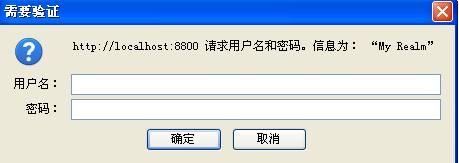Http认证之Digest认证
和讲Basic篇的内容差不多,不同的是过程采用的是DIGEST认证:
Tomcat配置:
1 在tomcat的webapps下新建一个目录authen,再建立子目录subdir,下面放一个index.jsp
2 在authen目录下建立WEB-INF目录,下放web.xml文件,内容如下
3 在tomcat的tomcat-users.xml文件中添加一个用户名密码为test,test的用户,角色test。
客户端访问:
访问http://localhost:port/authen/subdir/index.jsp
会弹出对话框提示认证,输入test test可以登录。

工作流程(通过firebug可以查看请求头)
1 客户端先发请求(不知道要认证,头里不包含任何特殊信息)
2 服务器发一个401返回,并含有下面的头

3 客户端认证,含有下面的头

response="..."就是客户端用来签名的部分。
缺点:
监听到消息的攻击者可以使用这个消息提交请求。
httpclient中的实现
查看org.apache.commons.httpclient.auth包的DigestScheme类的authenticate方法。
RFC2617描述了计算方法:
A valid response contains a checksum (by default, the MD5 checksum) of the username, the password, the given nonce value, the HTTP method, and the requested URI.
Tomcat配置:
1 在tomcat的webapps下新建一个目录authen,再建立子目录subdir,下面放一个index.jsp
2 在authen目录下建立WEB-INF目录,下放web.xml文件,内容如下
- <security-constraint>
- <web-resource-collection>
- <web-resource-name>
- My App
- </web-resource-name>
- <url-pattern>/subdir/*</url-pattern>
- </web-resource-collection>
- <auth-constraint>
- <role-name>test</role-name>
- </auth-constraint>
- </security-constraint>
- <login-config>
- <auth-method>DIGEST</auth-method> <!-- DIGEST here -->
- <realm-name>My Realm</realm-name>
- </login-config>
3 在tomcat的tomcat-users.xml文件中添加一个用户名密码为test,test的用户,角色test。
客户端访问:
访问http://localhost:port/authen/subdir/index.jsp
会弹出对话框提示认证,输入test test可以登录。

工作流程(通过firebug可以查看请求头)
1 客户端先发请求(不知道要认证,头里不包含任何特殊信息)
2 服务器发一个401返回,并含有下面的头

3 客户端认证,含有下面的头

response="..."就是客户端用来签名的部分。
缺点:
监听到消息的攻击者可以使用这个消息提交请求。
httpclient中的实现
查看org.apache.commons.httpclient.auth包的DigestScheme类的authenticate方法。
RFC2617描述了计算方法:
A valid response contains a checksum (by default, the MD5 checksum) of the username, the password, the given nonce value, the HTTP method, and the requested URI.